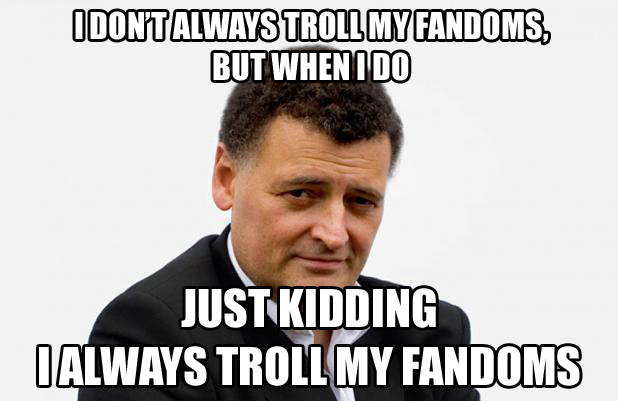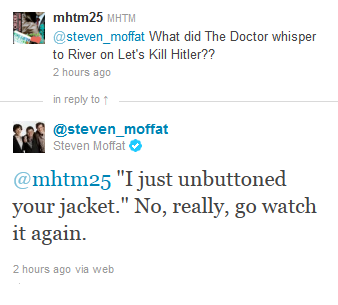Dana Scully
Special Agent
- AKA
- YACCBS, Legato Bluesummers, Daenaerys Targaryen, Revy, Kate Beckett, Samantha Carter, Matsumoto Rangiku
There's a difference between letting a city die and letting an entire species die.
Agreed, but there's now no reason he can't go back and save Pompeii by pocket-universing it. Or pocket-universe every town/planet/solar system that according to history was 'destroyed'.
But even with this 'retcon' the end result was the same: Gallifrey burned and all the Time Lords with it. It's similar to Waters of Mars, where the events of the fixed point change but all the important aspects remain (namely...Adeline? the captain lady dying) and therefore the conclusion (the granddaughter exploring space) is still the same. The plots in both cases are sort of retconned, but the character development (Doctor destroying Gallifrey/captain lady sacrificing herself) is not.But... the entire plan in EoT literally wouldn't work if the big boom were inescapable. At all. If it's really an inescapable, fixed point in time, then the Time Lords being defeated is a foregone conclusion and there is no dramatic tension in EoT whatsoever. If Rassilon's plan has even the remotest chance of succeeding then it's actually a case where time can still be rewritten, in which case the boom isn't inescapable. So as far as I can tell, either this is a plot hole in RTD's writing or it's just an example of him retconning himself. Either way it's a case where the show has been inconsistent and it's not surprising Moffat went with the later and more detailed established chronology of events.
With DotD, a similar plot-retcon happens where events change but end result is the same (Time War ends, as far as the Doctor's concerned he destroyed Gallifrey). The problem is that it also retcons the character - the Doctor no longer pushed the button, which is a Big Deal in terms of his character. In-universe it doesn't matter because he still thinks he killed all his people, but out-of-universe it completely undermines any emotional response I as a viewer have to his guilt in S1-7. I appreciate that this doesn't bother everyone, but for me it really does ruin pretty much all of Nine and Ten's arcs.
ngl "science fiction isn't real life" is one of my pet peeves. You're right, of course, it's not real life, which is why it's as entertaining as it is, but it still needs to be relatable. Like you said, in life there isn't always a third option, and it was nice to see that reflected in the narrative.Take a third option, as he's always done. Again, the idea that the character wouldn't find another way, especially after he's had an additional four hundred years to think about it and revisit his own actions, always rang false.
...
I agree that sometimes there isn't always a third option in real life. But on the other hand DW isn't real life, and it's also pretty unbelievable that after four hundred years of thinking a character as resourceful as the Doctor wouldn't come up with one for the action he believes he's committed that he has come to loathe himself for more than any other in his entire life.
As I said before, if the Doctor had spent 400 years coming up with a plan to save Gallifrey I would've been fine with it - it's that he apparently never destroyed it at all I have an issue with.
off-topic sorta but did they ever explain how the Teselecta!Doctor mimicked regeneration energy? I've always wondered about that.since the plot of the sixth series centred around the idea that the Doctor was going to die at the end of it, and the only reason he didn't die at the end is because no one had ever seen what they thought they had.
Did you seriously just ignore LITERALLY the next thing I wrote after that, where I explain that the intent is different - which is addressed in DotD, but the immediate consequences are the same, and the long-term potential is different? Sure it seems like I'm being unreasonable if you're cherry picking quotes and cutting them off to make it look like I'm saying something different than I really am.
earlier in thread said:He's still the same person, who made the same decision, suffered the same consequences, and is now dealing with a different version of those same consequences, where failing to find them is equivalent to him killing them again (Schrödinger's Gallifrey).
I still had this on my mind
 It wasn't clear to me in your later post that you were agreeing that it's not the same thing, but with the way you worded it here I see what you're getting at.
It wasn't clear to me in your later post that you were agreeing that it's not the same thing, but with the way you worded it here I see what you're getting at.Believe it or not I do understand how time travel works on the show. :/*sigh*
See, this is why I explained how Time Travel works in Doctor Who previously...
Yes, she brings him to see Ten and Eleven, both of whom the War Doctor calls great men. But she never brings him to any sort of reality where Gallifrey burns. All she ever shows him are projections of the children of Gallifrey dying in the Dalek assault (currently happening at the time, so basically a live newscast) or the children emerging into the sun (whatwill happen if the Doctor saves Gallifrey, as there will no longer be any Daleks blasting people with lasers).The Moment says, "Do you want to see who you become if you burn Gallifrey?" (paraphrase) If you're a trans-temporal entity - it's not an IDEA, it's a reality. She brought him to see the reality of who he became as a result of that action.
He's not rewriting his timeline. Gallifrey never burned. Moffat himself says as much in that interview. His future selves changed events because they think they burned it. (Which is all very stupid, imo, but that's neither here nor there.) "No more" was the Doctor being 100% done with the Time War/chosen for its word play value in conjunction with Gallifrey Falls, not some reference to Gallifrey burning once upon a time.Up until he actually rewrites his timeline by passing through his own timestream, Gallifrey burned by his hand. His timeline doesn't have a burned Gallifrey in it anymore, because he changed those events with his future selves, BECAUSE of who he became by burning it. Again, "no more" NOT "never."
1) As explained above, no, Gallifrey did not burn. Nothing in the episode suggests it did. Moffat himself says it didn't.Yes, because 1) This is what he would have knowledge of because in DotD he's not moving parallel to his own timestream, and thus only the latest version of himself retains the knowledge of altering his own past and 2) depending on if you're looking at the progression of the events in the NuWho Series as being the Doctor's timestream, rather than his timeline - it's still true.
Example: In Clara's timestream, she entered the Heart of the TARDIS. In Clara's timeline, she never entered the Heart of the TARDIS. Saying Gallifrey never burned because of DotD is like saying that Clara never died in the Heart of the TARDIS, because she prevented it with her intervention.
Both events happened.
2) I'm not sure where you're getting all this timestream stuff? From what I recall, it's just essentially another word for timeline, except that the speed at which it moves is different (ie, Girl Who Waited). Anyways, Journey to the Centre of the TARDIS was based entirely upon a giant reset button, which...was not a thing in DoTD? so I don't think the analogy works.








 But seriously though, great news, especially since I don't think that I could take another split series again. It's just such a shame that we'll get a glimpse of a new Doctor then have to wait so long to see his adventures begin.
But seriously though, great news, especially since I don't think that I could take another split series again. It's just such a shame that we'll get a glimpse of a new Doctor then have to wait so long to see his adventures begin.